
- Data Structures & Algorithms
- DSA - Home
- DSA - Overview
- DSA - Environment Setup
- DSA - Algorithms Basics
- DSA - Asymptotic Analysis
- Data Structures
- DSA - Data Structure Basics
- DSA - Data Structures and Types
- DSA - Array Data Structure
- Linked Lists
- DSA - Linked List Data Structure
- DSA - Doubly Linked List Data Structure
- DSA - Circular Linked List Data Structure
- Stack & Queue
- DSA - Stack Data Structure
- DSA - Expression Parsing
- DSA - Queue Data Structure
- Searching Algorithms
- DSA - Searching Algorithms
- DSA - Linear Search Algorithm
- DSA - Binary Search Algorithm
- DSA - Interpolation Search
- DSA - Jump Search Algorithm
- DSA - Exponential Search
- DSA - Fibonacci Search
- DSA - Sublist Search
- DSA - Hash Table
- Sorting Algorithms
- DSA - Sorting Algorithms
- DSA - Bubble Sort Algorithm
- DSA - Insertion Sort Algorithm
- DSA - Selection Sort Algorithm
- DSA - Merge Sort Algorithm
- DSA - Shell Sort Algorithm
- DSA - Heap Sort
- DSA - Bucket Sort Algorithm
- DSA - Counting Sort Algorithm
- DSA - Radix Sort Algorithm
- DSA - Quick Sort Algorithm
- Graph Data Structure
- DSA - Graph Data Structure
- DSA - Depth First Traversal
- DSA - Breadth First Traversal
- DSA - Spanning Tree
- Tree Data Structure
- DSA - Tree Data Structure
- DSA - Tree Traversal
- DSA - Binary Search Tree
- DSA - AVL Tree
- DSA - Red Black Trees
- DSA - B Trees
- DSA - B+ Trees
- DSA - Splay Trees
- DSA - Tries
- DSA - Heap Data Structure
- Recursion
- DSA - Recursion Algorithms
- DSA - Tower of Hanoi Using Recursion
- DSA - Fibonacci Series Using Recursion
- Divide and Conquer
- DSA - Divide and Conquer
- DSA - Max-Min Problem
- DSA - Strassen's Matrix Multiplication
- DSA - Karatsuba Algorithm
- Greedy Algorithms
- DSA - Greedy Algorithms
- DSA - Travelling Salesman Problem (Greedy Approach)
- DSA - Prim's Minimal Spanning Tree
- DSA - Kruskal's Minimal Spanning Tree
- DSA - Dijkstra's Shortest Path Algorithm
- DSA - Map Colouring Algorithm
- DSA - Fractional Knapsack Problem
- DSA - Job Sequencing with Deadline
- DSA - Optimal Merge Pattern Algorithm
- Dynamic Programming
- DSA - Dynamic Programming
- DSA - Matrix Chain Multiplication
- DSA - Floyd Warshall Algorithm
- DSA - 0-1 Knapsack Problem
- DSA - Longest Common Subsequence Algorithm
- DSA - Travelling Salesman Problem (Dynamic Approach)
- Approximation Algorithms
- DSA - Approximation Algorithms
- DSA - Vertex Cover Algorithm
- DSA - Set Cover Problem
- DSA - Travelling Salesman Problem (Approximation Approach)
- Randomized Algorithms
- DSA - Randomized Algorithms
- DSA - Randomized Quick Sort Algorithm
- DSA - Karger’s Minimum Cut Algorithm
- DSA - Fisher-Yates Shuffle Algorithm
- DSA Useful Resources
- DSA - Questions and Answers
- DSA - Quick Guide
- DSA - Useful Resources
- DSA - Discussion
Kruskal’s Minimal Spanning Tree Algorithm
Kruskal's minimal spanning tree algorithm is one of the efficient methods to find the minimum spanning tree of a graph. A minimum spanning tree is a subgraph that connects all the vertices present in the main graph with the least possible edges and minimum cost (sum of the weights assigned to each edge).
The algorithm first starts from the forest – which is defined as a subgraph containing only vertices of the main graph – of the graph, adding the least cost edges later until the minimum spanning tree is created without forming cycles in the graph.
Kruskal's algorithm has easier implementation than prim’s algorithm, but has higher complexity.
Kruskal's Algorithm
The inputs taken by the kruskal’s algorithm are the graph G {V, E}, where V is the set of vertices and E is the set of edges, and the source vertex S and the minimum spanning tree of graph G is obtained as an output.
Algorithm
Sort all the edges in the graph in an ascending order and store it in an array edge[].
| Edge | ||||||||
|---|---|---|---|---|---|---|---|---|
| Cost |
Construct the forest of the graph on a plane with all the vertices in it.
Select the least cost edge from the edge[] array and add it into the forest of the graph. Mark the vertices visited by adding them into the visited[] array.
Repeat the steps 2 and 3 until all the vertices are visited without having any cycles forming in the graph
When all the vertices are visited, the minimum spanning tree is formed.
Calculate the minimum cost of the output spanning tree formed.
Examples
Construct a minimum spanning tree using kruskal’s algorithm for the graph given below −

Solution
As the first step, sort all the edges in the given graph in an ascending order and store the values in an array.
| Edge | B→D | A→B | C→F | F→E | B→C | G→F | A→G | C→D | D→E | C→G |
|---|---|---|---|---|---|---|---|---|---|---|
| Cost | 5 | 6 | 9 | 10 | 11 | 12 | 15 | 17 | 22 | 25 |
Then, construct a forest of the given graph on a single plane.
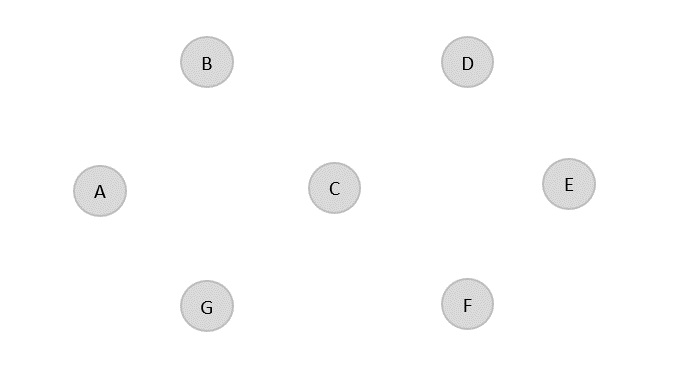
From the list of sorted edge costs, select the least cost edge and add it onto the forest in output graph.
B → D = 5
Minimum cost = 5
Visited array, v = {B, D}
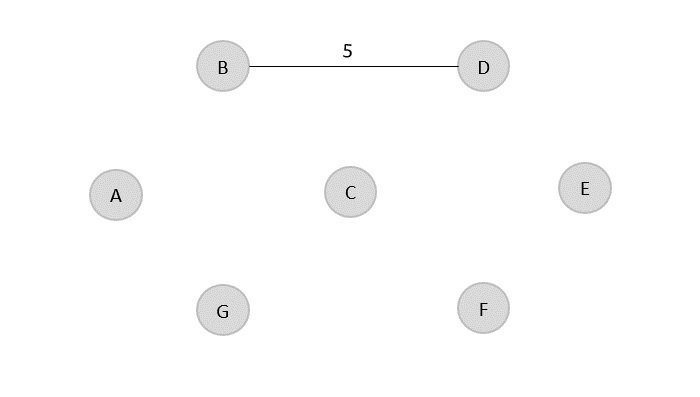
Similarly, the next least cost edge is B → A = 6; so we add it onto the output graph.
Minimum cost = 5 + 6 = 11
Visited array, v = {B, D, A}
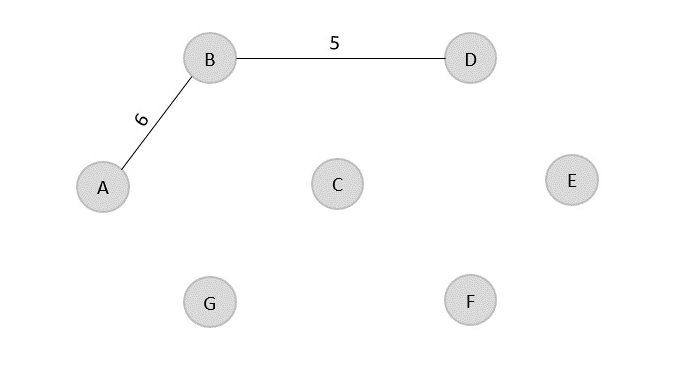
The next least cost edge is C → F = 9; add it onto the output graph.
Minimum Cost = 5 + 6 + 9 = 20
Visited array, v = {B, D, A, C, F}
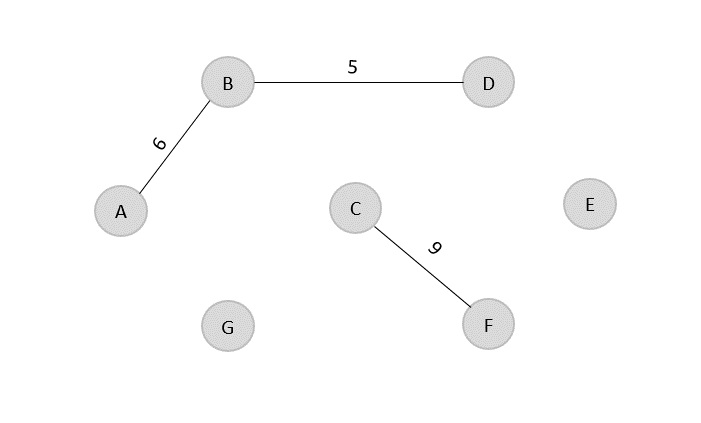
The next edge to be added onto the output graph is F → E = 10.
Minimum Cost = 5 + 6 + 9 + 10 = 30
Visited array, v = {B, D, A, C, F, E}
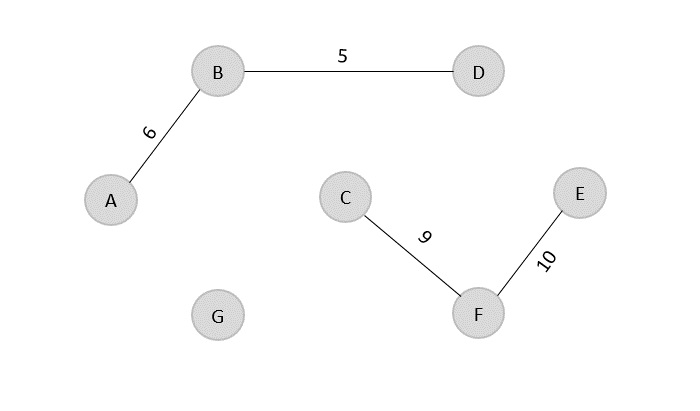
The next edge from the least cost array is B → C = 11, hence we add it in the output graph.
Minimum cost = 5 + 6 + 9 + 10 + 11 = 41
Visited array, v = {B, D, A, C, F, E}
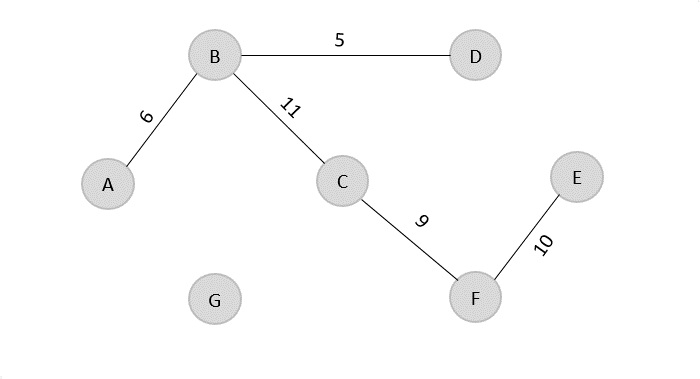
The last edge from the least cost array to be added in the output graph is F → G = 12.
Minimum cost = 5 + 6 + 9 + 10 + 11 + 12 = 53
Visited array, v = {B, D, A, C, F, E, G}
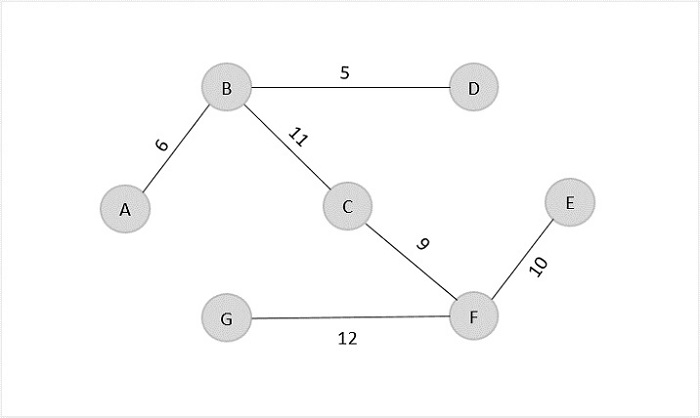
The obtained result is the minimum spanning tree of the given graph with cost = 53.
Example
The final program implements the Kruskal’s minimum spanning tree problem that takes the cost adjacency matrix as the input and prints the shortest path as the output along with the minimum cost.
#include <stdio.h>
#include <stdlib.h>
const int inf = 999999;
int k, a, b, u, v, n, ne = 1;
int mincost = 0;
int cost[3][3] = {{0, 10, 20},{12, 0,15},{16, 18, 0}};
int p[9] = {0};
int applyfind(int i)
{
while(p[i] != 0)
i=p[i];
return i;
}
int applyunion(int i,int j)
{
if(i!=j) {
p[j]=i;
return 1;
}
return 0;
}
int main()
{
n = 3;
int i, j;
for (int i = 0; i < n; i++) {
for (int j = 0; j < n; j++) {
if (cost[i][j] == 0) {
cost[i][j] = inf;
}
}
}
printf("Minimum Cost Spanning Tree: \n");
while(ne < n) {
int min_val = inf;
for(i=0; i<n; i++) {
for(j=0; j <n; j++) {
if(cost[i][j] < min_val) {
min_val = cost[i][j];
a = u = i;
b = v = j;
}
}
}
u = applyfind(u);
v = applyfind(v);
if(applyunion(u, v) != 0) {
printf("%d -> %d\n", a, b);
mincost +=min_val;
}
cost[a][b] = cost[b][a] = 999;
ne++;
}
printf("Minimum cost = %d",mincost);
return 0;
}
Output
Minimum Cost Spanning Tree: 0 -> 1 1 -> 2 Minimum cost = 25
#include <iostream>
using namespace std;
const int inf = 999999;
int k, a, b, u, v, n, ne = 1;
int mincost = 0;
int cost[3][3] = {{0, 10, 20}, {12, 0, 15}, {16, 18, 0}};
int p[9] = {0};
int applyfind(int i)
{
while (p[i] != 0) {
i = p[i];
}
return i;
}
int applyunion(int i, int j)
{
if (i != j) {
p[j] = i;
return 1;
}
return 0;
}
int main()
{
n = 3;
for (int i = 0; i < n; i++) {
for (int j = 0; j < n; j++) {
if (cost[i][j] == 0) {
cost[i][j] = inf;
}
}
}
cout << "Minimum Cost Spanning Tree:\n";
while (ne < n) {
int min_val = inf;
for (int i = 0; i < n; i++) {
for (int j = 0;
j < n; j++) {
if (cost[i][j] < min_val) {
min_val = cost[i][j];
a = u = i;
b = v = j;
}
}
}
u = applyfind(u);
v = applyfind(v);
if (applyunion(u, v) != 0) {
cout << a << " -> " << b << "\n";
mincost += min_val;
}
cost[a][b] = cost[b][a] = 999;
ne++;
}
cout << "Minimum cost = " << mincost << endl;
return 0;
}
Output
Minimum Cost Spanning Tree: 0 -> 1 1 -> 2 Minimum cost = 25
import java.util.*;
public class Main {
static int k, a, b, u, v, n, ne = 1, min, mincost = 0;
static int cost[][] = {{0, 10, 20},{12, 0, 15},{16, 18, 0}};
static int p[] = new int[9];
static int inf = 999999;
static int applyfind(int i) {
while(p[i] != 0)
i=p[i];
return i;
}
static int applyunion(int i,int j) {
if(i!=j) {
p[j]=i;
return 1;
}
return 0;
}
public static void main(String args[]) {
int i, j;
n = 3;
for(i=0; i<n; i++)
for(j=0; j<n; j++) {
if(cost[i][j]==0)
cost[i][j]= inf;
}
System.out.println("Minimum Cost Spanning Tree: ");
while(ne < n) {
min = inf;
for(i=0; i<n; i++) {
for(j=0; j<n; j++) {
if(cost[i][j] < min) {
min=cost[i][j];
a=u=i;
b=v=j;
}
}
}
u=applyfind(u);
v=applyfind(v);
if(applyunion(u,v) != 0) {
System.out.println(a + " -> " + b);
mincost += min;
}
cost[a][b]=cost[b][a]=999;
ne +=1;
}
System.out.println("Minimum cost = " + mincost);
}
}
Output
Minimum Cost Spanning Tree: 0 -> 1 1 -> 2 Minimum cost = 25
inf = 999999
k, a, b, u, v, n, ne = 0, 0, 0, 0, 0, 0, 1
mincost = 0
cost = [[0, 10, 20], [12, 0, 15], [16, 18, 0]]
p = [0] * 9
def applyfind(i):
while p[i] != 0:
i = p[i]
return i
def applyunion(i, j):
if i != j:
p[j] = i
return 1
return 0
n = 3
for i in range(n):
for j in range(n):
if cost[i][j] == 0:
cost[i][j] = inf
print("Minimum Cost Spanning Tree:")
while ne < n:
min_val = inf
for i in range(n):
for j in range(n):
if cost[i][j] < min_val:
min_val = cost[i][j]
a = u = i
b = v = j
u = applyfind(u)
v = applyfind(v)
if applyunion(u, v) != 0:
print(f"{a} -> {b}")
mincost += min_val
cost[a][b] = cost[b][a] = 999
ne += 1
print(f"Minimum cost = {mincost}")
Output
Minimum Cost Spanning Tree: 0 -> 1 1 -> 2 Minimum cost = 25
